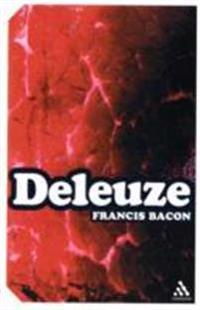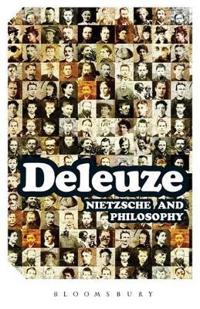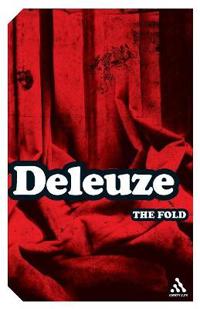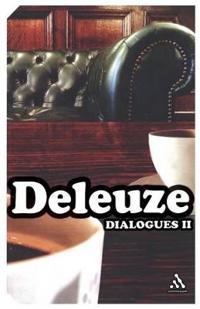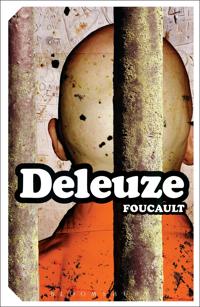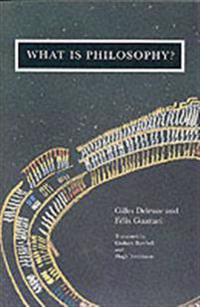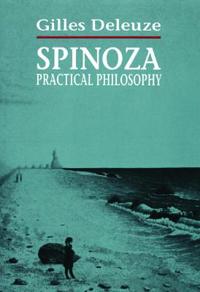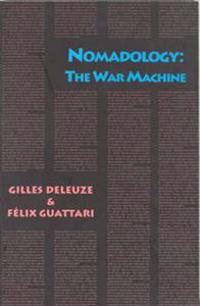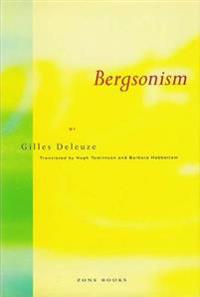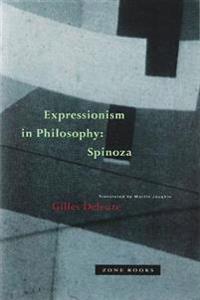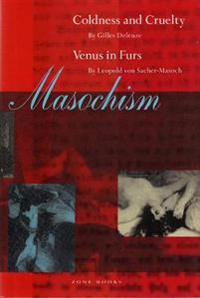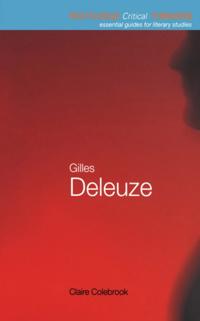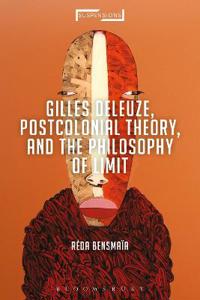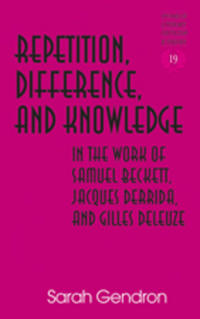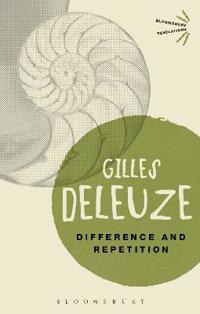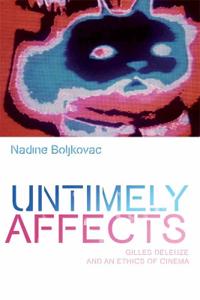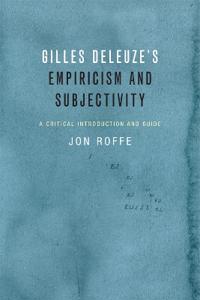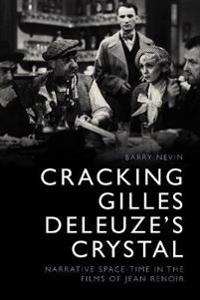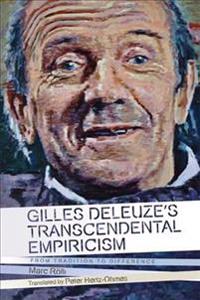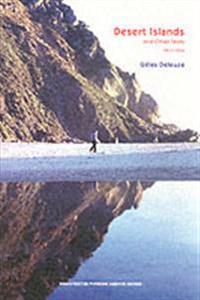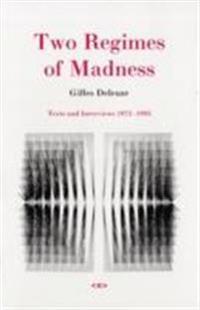Francis Bacon (Häftad)
avGilles Deleuze
ISBN: 9780826479303 - UTGIVEN: 200503Francis Bacon is Deleuze's long-awaited work on Bacon, widely regarded as the one of the most radical painters of the twentieth century. The book presents a deep engagement with Bacon's work and the nature of art. Deleuze analyses the distinctive innovations that came to mark Bacon's style while int[...]
Nietzsche and Philosophy (Häftad)
avGilles Deleuze
ISBN: 9780826490759 - UTGIVEN: 200603Gilles Deleuze (1925-1995) was Professor of Philosophy at the University of Paris VIII. He is a key figure in poststructuralism, and one of the most influential philosophers of the twentieth century. "Nietzsche and Philosophy" has long been recognised as one of the most important accounts of Nietzsc[...]
The Fold (Häftad)
avGilles Deleuze
ISBN: 9780826490766 - UTGIVEN: 200603Gilles Deleuze (1925-1995) was Professor of Philosophy at the University of Paris VIII. He is a key figure in poststructuralism, and one of the most influential philosophers of the twentieth century. In The Fold Deleuze proposes a new and radical way of understanding philosophy and art. Leibniz drew[...]
Dialogues II (Häftad)
avGilles Deleuze
ISBN: 9780826490773 - UTGIVEN: 200603Gilles Deleuze (1925-1995) was Professor of Philosophy at the University of Paris VIII. He is a key figure in post-structuralism, and one of the most influential philosophers of the twentieth century. In "Dialogues II" Deleuze examines his philosophical pluralism in a series of discussions with Clai[...]
Foucault (Häftad)
avGilles Deleuze
ISBN: 9780826490780 - UTGIVEN: 200603Giles Deleuze (1925-1995) was Professor of Philosophy at the University of Paris VIII. He is a key figure in poststructuralism and one of the most influential philosophers of the twentieth century. In "Foucault", Deleuze presents one of the most incisive and productive analyses of the work of Michel[...]
What is Philosophy? (Häftad)
avGilles Deleuze, Felix Guattari
ISBN: 9780860916864 - UTGIVEN: 199406"The question 'what is philosophy?' can perhaps only be posed lat in life, with the arrival of old age and the time for speaking concretely. It is a question posed in a moment of quiet restlessness, at midnight, when there is no longer anything to ask." Posing that question, Deleuze and Guattari wor[...]
Spinoza (Inbunden)
avGilles Deleuze
ISBN: 9780872862180 - UTGIVEN: 198804Spinoza's theoretical philosophy is one of the most radical attempts to construct a pure ontology with a single infinite substance. This book, which presents Spinoza's main ideas in dictionary form, has as its subject the opposition between ethics and morality, and the link between ethical and ontol[...]
Nomadology (Häftad)
avGilles Deleuze, Felix Guattari
ISBN: 9780936756097 - UTGIVEN: 198601In this daring essay inspired by Nietzsche, Gilles Deleuze and Felix Guattari redefine the relation between the state and its war machine. Far from being a part of the state, warriers (the army) are nomads who always come from the outside and keep threatening the authority of the state. In the same [...]
Bergsonism (Häftad)
avGilles Deleuze
ISBN: 9780942299076 - UTGIVEN: 199101Examines the philosophy of Henri Bergson, explains his concepts of duration, memory, and elan vital, and discusses the influence of science on Bergson[...]
Expression in Philosophy (Häftad)
avGilles Deleuze
ISBN: 9780942299519 - UTGIVEN: 199204In this extraordinary work Gilles Deleuze, the most renowned living philosopher in France, reflects on one of the figures of the past who has most influenced his own sweeping reconfiguration of the tasks of philosophy.Deleuze's brilliant text shows how current definitions of philosophy do not apply [...]
Masochism (Häftad)
avGilles Deleuze, Leopold von Sacher-Masoch
ISBN: 9780942299557 - UTGIVEN: 199105In his stunning essay, Coldness and Cruelty, Gilles Deleuze provides a rigorous and informed philosophical examination of the work of the late 19th-century German novelist Leopold von Sacher-Masoch. Deleuze's essay, certainly the most profound study yet produced on the relations between sadism and m[...]
Gilles Deleuze
ISBN: 9781134578023 - UTGIVEN: 2001-09Why think? Not, according to Gilles Deleuze, in order to be clever, but because thinking transforms life. Why read literature? Not for pure entertainment, Deleuze tells us, but because literature can recreate the boundaries of life. With his emphasis on creation, the future and the enhancement of li[...]
Gilles Deleuze
ISBN: 9781134578030 - UTGIVEN: 2015-06Why think? Not, according to Gilles Deleuze, in order to be clever, but because thinking transforms life. Why read literature? Not for pure entertainment, Deleuze tells us, but because literature can recreate the boundaries of life. With his emphasis on creation, the future and the enhancement of li[...]
Gilles Deleuze, Postcolonial Theory, and the Philosophy of Limit
ISBN: 9781350004382 - UTGIVEN: 2017-02Does a philosopher have an 'identity'? What kind of 'identity' is mobilized when the work of a philosopher becomes a major reference for certain schools of thought, as in the case of Gilles Deleuze and postcolonial theory? Have the promoters of a generalized Deleuzeanism taken care their usage of hi[...]
Gilles Deleuze, Postcolonial Theory, and the Philosophy of Limit
ISBN: 9781350004399 - UTGIVEN: 2017-02Does a philosopher have an `identity'? What kind of `identity' is mobilized when the work of a philosopher becomes a major reference for certain schools of thought, as in the case of Gilles Deleuze and postcolonial theory? Have the promoters of a generalized Deleuzeanism taken care their usage of hi[...]
Repetition, Difference, and Knowledge in the Work of Samuel Beckett, Jacques Derrida, and Gilles Deleuze
ISBN: 9781433103759 - UTGIVEN: 2008-10Cinema II (Häftad)
avGilles Deleuze
ISBN: 9781472512604 - UTGIVEN: 201310Gilles Deleuze was one of the most influential figures in twentieth-century philosophy, whose master-works, Difference and Repetition and - with Felix Guattari - A Thousand Plateaus and Anti-Oedipus have become one of the most widely-influential bodies of work in contemporary thought. Cinema II is D[...]
Difference and Repetition (Häftad)
avGilles Deleuze
ISBN: 9781472572356 - UTGIVEN: 2014-10Since its publication in 1968, Difference and Repetition, an exposition of the critique of identity, has come to be considered a contemporary classic in philosophy and one of Gilles Deleuze's most important works. The text follows the development of two central concepts, those of pure difference and[...]
Untimely Affects: Gilles Deleuze and an Ethics of Cinema (häftad)
ISBN: 9781474404747 - UTGIVEN: 2015-06How do the practices of philosophy and film converge in ethical and political theory? Untimely Affects is an ethical and aesthetic interweaving of Deleuzian philosophy and close film analysis to discern how thought persists productively after the horrors of World War II. In the first extensive analy[...]
Gilles Deleuze's Empiricism and Subjectivity
ISBN: 9781474405836 - UTGIVEN: 2017-01This guide explains the key arguments of Empiricism and Subjectivity, organised thematically. It features an Appendix with a propositional summary of the book, a final chapter on the movement of the themes of Empiricism and Subjectivity through Deleuze's later work, plus substantial suggestions for [...]
Cracking Gilles Deleuze's Crystal
ISBN: 9781474426299 - UTGIVEN: 2018-09Jean Renoir is widely considered as one of the most important technical innovators and politically engaged filmmakers in cinema history. Reassessing the unique qualities of Renoir's influential visual style by interpreting his films through a blend of Gilles Deleuze's film philosophy and previously [...]
Gilles Deleuze's Transcendental Empiricism
ISBN: 9781474432252 - UTGIVEN: 2018-03Reconstructs Deleuze's philosophy as transcendental empiricism: two philosophies previously seen as contradictory Deleuze's readings of Hume, Spinoza, Bergson and Nietzsche respond to philosophical critiques of classical and modern empiricism. However, Deleuze's arguments against those critiques b[...]
Desert Islands (Häftad)
avGilles Deleuze
ISBN: 9781584350187 - UTGIVEN: 200402"One day, perhaps, this century will be Deleuzian," Michel Foucault once wrote. This book anthologizes 40 texts and interviews written over 20 years by renowned French philosopher Gilles Deleuze, who died in 1995. The early texts, from 1953-1966 (on Rousseau, Kafka, Jarry, etc.), belong to literary [...]
Two Regimes of Madness (Häftad)
avGilles Deleuze
ISBN: 9781584350620 - UTGIVEN: 200711People tend to confuse winning freedom with conversion to capitalism. It is doubtful that the joys of capitalism are enough to free peoples...The American "revolution" failed long ago, long before the Soviet one. Revolutionary situations and attempts are born of capitalism itself and will not soon d[...]
Gilles Deleuze
ISBN: 9781780237312 - UTGIVEN: 2017-06Gilles Deleuze, the person and philosopher, was both singular and multifaceted. Frida Beckman traces Deleuze's remarkable intellectual journey, mapping the encounters from which his life and work emerged. She considers how his life and philosophical developments resonate with historical, political a[...]

